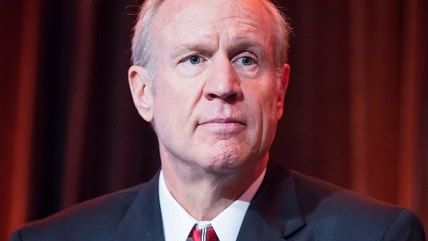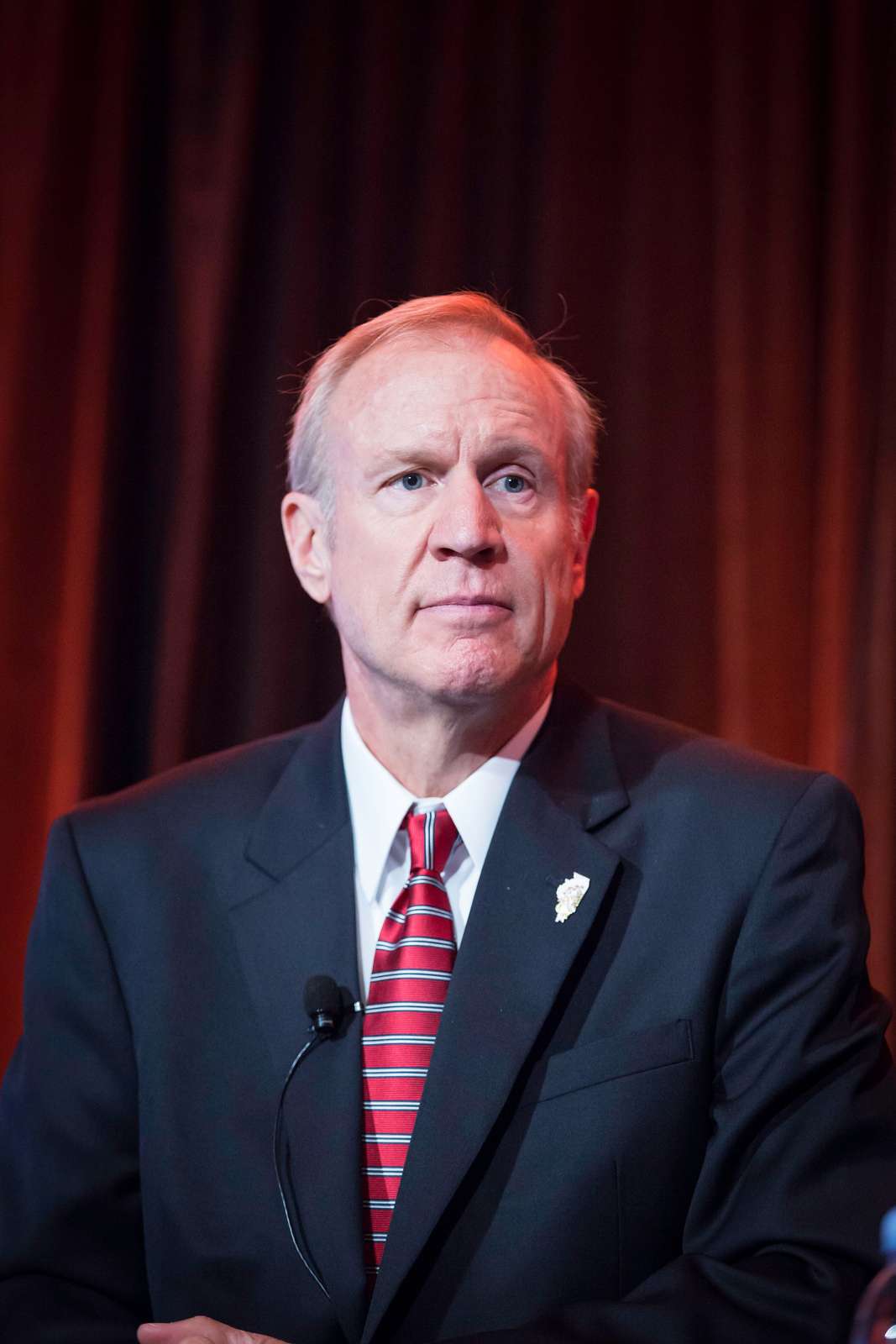Illinois' New Governor Takes on Public Unions with Executive Order Ending Forced Dues
'Government union bargaining and government union political activity are inextricably linked,' he says.


Illinois' chronic fiscal problems likely contributed to state voters bouncing Democratic Gov. Pat Quinn out of office in the deeply blue state, replacing him with Republican businessman Bruce Rauner last November.
Now Rauner is making good on his more conservative credentials, calling on cities in Illinois to pass their own "right to work" laws (the state's extremely Democratic legislature would never ponder such a move). Then on Monday he essentially declared war on the incredible power of public sector unions, declaring by executive order that state workers who did not want to join unions could not be forced to pay "fair share" dues.
From the Chicago Tribune:
Anticipating a strong pushback from organized labor, Rauner filed a pre-emptive federal lawsuit in Chicago seeking to have his decision declared legal. But the move likely will spark additional court battles as unions quickly decried the effort as an illegal abuse of power. It's also possible Democratic lawmakers could vote to overturn Rauner's executive order.
Under state law, employees can decline to join a union but are still on the hook for "fair share" fees related to collective bargaining and contract negotiations. The idea is that if all employees are getting the benefits from a new contract, everyone should contribute to the cost.
Illinois statute prohibits those fees from being used to support political activities, but Rauner contended it's nearly impossible to draw a distinction because public sector unions directly negotiate with the government.
"Government union bargaining and government union political activity are inextricably linked," Rauner said. "As a result, an employee who is forced to pay unfair share dues is being forced to fund political activity with which they disagree. That is a clear violation of First Amendment rights and something that, as governor, I am duty-bound to correct."
The move would affect about 6,500 out of 42,000 workers. Rauner's pre-emptive suit may be read here (pdf). Rauner (and news coverage of the executive order) is invoking the Harris v. Quinn Supreme Court decision of last year to reinforce his argument. That ruling from last June was very narrow, though. The majority, 5-4, determined that the Illinois could not force home healthcare workers to accept union representation. While it may sound similar to what Rauner is ordering, that case revolved around the state treating private workers as though they were state employees on the specious basis of them receiving state subsidies, then using that status to force home care workers into accepting union representation.
While the ruling was narrow, the majority opinion written by Justice Samuel Alito did suggest there was an interest in revisiting on a larger scale the way labor unions, at least in the public sector, force its funding. The Tribune again notes:
[I]n ruling on the 2014 home health care case, Justice Samuel A. Alito argued that the court's analysis in the Detroit case had been "questionable on several grounds."
"In the public sector, core issues such as wages, pensions and benefits are important political issues, but that is generally not so in the private sector," Alito wrote. "In the years since (the ruling), as state and local expenditures on employee wages and benefits have mushroomed, the importance of the difference between bargaining in the public and private sectors has been driven home."
That argument was mirrored by Rauner's team in its lawsuit filed Monday. The suit asserts that "indeed, the significant impact that Illinois public sector labor costs have imposed and will continue to impose on the state's financial condition clearly demonstrates the degree to which Illinois state employee collective bargaining is an inherently political activity."
The Supreme Court is considering whether to take a similar case in California from teachers who don't want to have to pay dues to unions who lobby on political actions with which the teachers disagree. Read more about that case here.
Editor's Note: As of February 29, 2024, commenting privileges on reason.com posts are limited to Reason Plus subscribers. Past commenters are grandfathered in for a temporary period. Subscribe here to preserve your ability to comment. Your Reason Plus subscription also gives you an ad-free version of reason.com, along with full access to the digital edition and archives of Reason magazine. We request that comments be civil and on-topic. We do not moderate or assume any responsibility for comments, which are owned by the readers who post them. Comments do not represent the views of reason.com or Reason Foundation. We reserve the right to delete any comment and ban commenters for any reason at any time. Comments may only be edited within 5 minutes of posting. Report abuses.
Please to post comments


The move would affect about 6,500 out of 42,000 workers.
More than that, I would bet. A lot of full union members are only so because they have to pay the fucking dues anyway, might as well join.
Look at what happened to the teacher's unions in Wisconsin after they were given the right to exit without being stuck with the dues.
That's my circumstance in my current day job, and my first reaction to having seen those numbers
I heard this on NPR the other day. The reporter was practically in tears. Sweet, salty, leftist tears.
I read about it on yahoo or bloomberg or somewhere (to be honest they all sound the same in tone, if not straight up copypastas). The tears are so, so delicious.
This isngoing to be worse than the Wisconson fiasco. Oh joy.
Is going. Android:(
Was Wisconsin a fiasco, though?
Yeah, a bunch of fat-assed union shits showed up and made much noise, but, ultimately, Walker won. And then he won the recall. So, I'd call that a win.
That's true. We had not such good in Ohio. Part of that was the strategy though.
It's a real shame you have to force people to do things that are good for them, like pay taxes and union dues, but people are dumb and someone has to be responsible for them.
Finally, someone who get it.
/progtard
So much compulsion needed for this superior economic and political system. Because people need to be beaten until they see five lights.
It's as if someone were beating you with a stick and saying, "Your business is rejoicing, your business is rejoicing," and you rise, shaky, and go marching off, muttering, "Our business is rejoicing, our business is rejoicing."
My business is rejoicing.
*lowers stick*
Da, very good, comrade!
Also, people need to be educated. Experts, those funded and chosen by government agents - not a bunch of self-educated wack-jobs, need to tell us what's good for us because we're too stupid to really understand.
We really just need to trust the NYT editorial page. They're super smart.
I had this argument with my father-in-law.
I said "Freedom isn't for everyone. Sometimes, the benevolent hand of government is needed to force people to make the 'right' decisions."
My father-in-law knew that I was being sarcastic, but he still managed to sputter "Yes!" before he began to froth at the mouth.
I don't know what the progs are so worried about. After all, unions are so obviously good for the workers that they'd never opt out, eh?
For that matter, I don't understand why the progs think that government workers need a union at all. These folks work for the government which according to progs is the source of all fairness, wisdom, and unicorns. Unlike those folks who work for evil profit-seeking private employers.
Good, this will help defund the unions obnoxious power over here. Glad I voted for him.
To get progressives on board with this, we need to start linking Union dues and speech. Educate people that Union dues contribute to unfair and lopsided speech in the political sphere, then they'll be all over banning it.
Just try to work "Citizens United" into the mix....that should distract 'em enough!